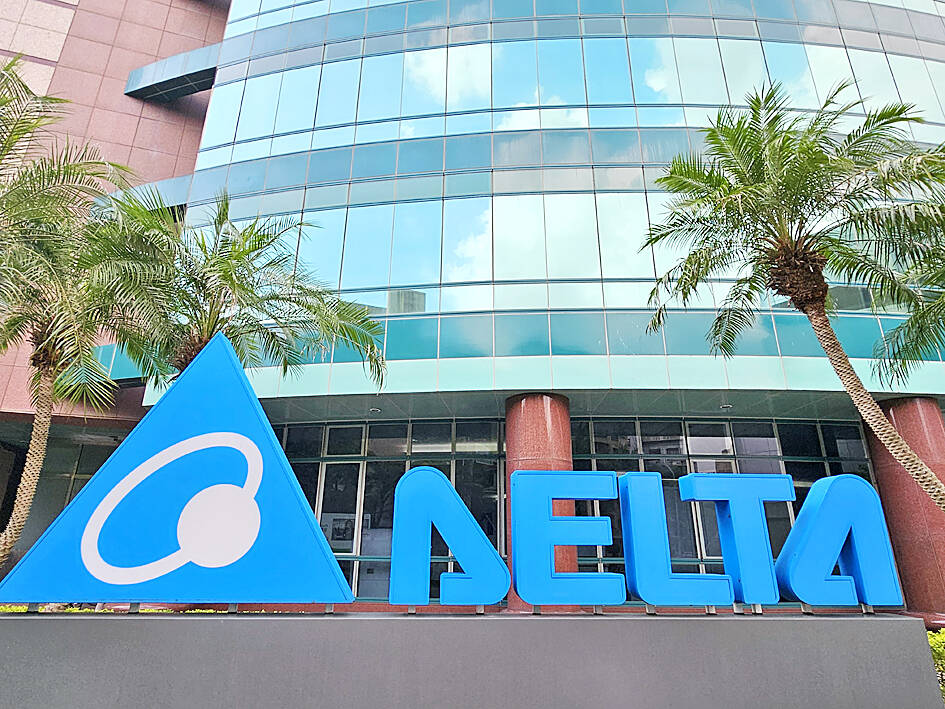Delta Electronics Inc’s (台達電) shares surpassed NT$900 for the first time yesterday, lifting its stock market value to the third-largest on the local main board, as the company’s power solutions and cooling products benefit from strong demand for artificial intelligence (AI) server power and data center infrastructure.
Shares of the leading provider of power electronics and thermal management solutions closed 2.14 percent higher at NT$907, a record high and valuing Delta at NT$2.36 trillion (US$78 billion), Taiwan Stock Exchange (TWSE) data showed.
The company’s market value was above handset chip designer MediaTek Inc’s (聯發科) NT$2.25 trillion, but behind iPhone assembler and AI server maker Hon Hai Precision Industry Co’s (鴻海) NT$3 trillion, TWSE data showed.

Photo: CNA
Taiwan Semiconductor Manufacturing Co (台積電), the world’s largest contract chipmaker, had a market cap of NT$33.58 trillion yesterday, still the most valuable company in Taiwan, the exchange’s data showed.
Delta is among several local companies in the power supply and heat dissipation sectors, including Lite-On Technology Corp (光寶科技) and Auras Technology Co (雙鴻科技), that have seen shares surge this year due to their rising exposure to the rapidly evolving AI server and data center markets.
“Delta’s good technology capability and well-established relationships with major clients could enable the company to better reap AI hardware growth than its peers,” S&P Global Ratings said in a statement in July.
As AI servers are becoming increasingly powerful and data centers consume huge amounts of electricity, the issues of power supply and heat dissipation have caught market attention, although challenges also arise from rapid changes in the power supply and thermal management for those applications, analysts said.
“Delta is benefiting from the clear centralized and high-voltage trend for power structures, accelerating liquid-cooling solution shipments, and continued market share gains,” Yuanta Securities Investment and Consulting Co (元大投顧) said in a note on Sept. 10.
Yuanta has set a 12-month target price of NT$1,050 for Delta, which has rallied 110.69 percent since the beginning of the year, outperforming the broader market’s 12.35 percent rise over the period, TWSE data showed.
Yuanta expects revenue contribution from AI-related components and related systems to reach NT$115.1 billion and account for 22 percent of Delta’s total revenue this year, from about 15 percent last year.
The figures are forecast to rise to NT$220.9 billion next year (34 percent of total revenue) and NT$367.8 billion in 2027 (45 percent of total revenue), the note said.

Taiwan’s rapidly aging population is fueling a sharp increase in homes occupied solely by elderly people, a trend that is reshaping the nation’s housing market and social fabric, real-estate brokers said yesterday. About 850,000 residences were occupied by elderly people in the first quarter, including 655,000 that housed only one resident, the Ministry of the Interior said. The figures have nearly doubled from a decade earlier, Great Home Realty Co (大家房屋) said, as people aged 65 and older now make up 20.8 percent of the population. “The so-called silver tsunami represents more than just a demographic shift — it could fundamentally redefine the

The US government on Wednesday sanctioned more than two dozen companies in China, Turkey and the United Arab Emirates, including offshoots of a US chip firm, accusing the businesses of providing illicit support to Iran’s military or proxies. The US Department of Commerce included two subsidiaries of US-based chip distributor Arrow Electronics Inc (艾睿電子) on its so-called entity list published on the federal register for facilitating purchases by Iran’s proxies of US tech. Arrow spokesman John Hourigan said that the subsidiaries have been operating in full compliance with US export control regulations and his company is discussing with the US Bureau of

Businesses across the global semiconductor supply chain are bracing themselves for disruptions from an escalating trade war, after China imposed curbs on rare earth mineral exports and the US responded with additional tariffs and restrictions on software sales to the Asian nation. China’s restrictions, the most targeted move yet to limit supplies of rare earth materials, represent the first major attempt by Beijing to exercise long-arm jurisdiction over foreign companies to target the semiconductor industry, threatening to stall the chips powering the artificial intelligence (AI) boom. They prompted US President Donald Trump on Friday to announce that he would impose an additional

China Airlines Ltd (CAL, 中華航空) said it expects peak season effects in the fourth quarter to continue to boost demand for passenger flights and cargo services, after reporting its second-highest-ever September sales on Monday. The carrier said it posted NT$15.88 billion (US$517 million) in consolidated sales last month, trailing only September last year’s NT$16.01 billion. Last month, CAL generated NT$8.77 billion from its passenger flights and NT$5.37 billion from cargo services, it said. In the first nine months of this year, the carrier posted NT$154.93 billion in cumulative sales, up 2.62 percent from a year earlier, marking the second-highest level for the January-September